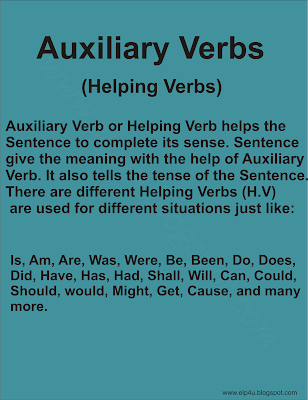Introduction
To make a Sentence we need some basic things, just like Subject, Verb, Object,
Complement, Adverbial and etc. But these all things are useless without
Auxiliary Verb. Auxiliary Verb is also called Helping Verb (H.V). It make the
Sentence a meaningful Sentence. Today we are going to discuss about Auxiliary
Helping Verbs.
Auxiliary Helping Verbs are also called Linking Verbs. We can
define Auxiliary Verb in such a manner that it helps the Sentence to complete
its sense. It gives the meaning to the Sentence. It also tells the tense of the
Sentence. Without Auxiliary Verbs we are unable to find what the Sentence
means.
Auxiliary
Verb Examples
Let’s have some Examples
of Helping Verbs:
He was worrying
about you.
|
In
this Sentence ‘was’ is used as a Helping Verb, if we remove Helping Verb from
this Sentence, this Sentence will have no meanings.
He ___ worrying about you.
|
If we are using another Helping Verb instead of ‘was’, the meaning of the Sentence will be changed (may be the tense too).
He
is worrying about you.
|
In short different Helping Verbs plays different roles in
different situations.
Difference
between Main Verb and Helping Verb
The major difference
between Main and Helping Verbs is “Main Verb" shows the
action in the Sentence and Helping Verb supports the main Verb to make a Sense”.
Main Verb can not describe its meaning unless it is connected with a Helping
Verb.
Helping
Verbs list
There
are different Auxiliary Verbs in English Grammar are used according to the different
situation. Here is a short list of Helping Verbs is given:
Auxiliary
Verb list:
Is
|
Am
|
Are
|
Was
|
Were
|
Be
|
Been
|
Do
|
Does
|
Did
|
Have
|
Has
|
Had
|
Would
|
Can
|
Could
|
Might
|
Should
|
Shall
|
will
|
Get
|
Cause
|
||
Etc.
1) I will
buy a car.
|
6) He was
not telling a lie.
|
2) Alia should
marry him.
|
7) You have
broken my heart.
|
3) Did
she call you?
|
8) Maria does
not eat fruits.
|
4) We are
playing Cricket.
|
9) They do
not believe us.
|
5) Harry could
do that.
|
10) Do
not pluck the flowers.
|
Summary
Auxiliary Verbs or Helping Verbs helps the Sentence to
complete its sense. A Sentence gives the meaning with the helps of Auxiliary
Verb. There are different Helping Verbs are used for different situations.
From the Author
It was something about Modal Auxiliary Verbs. To get more
check other Articles of ours and Stay with us to learn English free.



 About the Author
About the Author











0 comments: